
Is President Trump working to build his own personal army? Investigative reporter Radley Balko responds to Trump’s new executive order for a “standing National Guard quick reaction force” that the president can deploy at will. Trump has “always expressed envy for dictators and authoritarians overseas who have forces that they can deploy to do their own sort of personal bidding, whether it’s putting down protests or going after political opponents,” says Balko, who calls the order “a really dangerous development.”
Transcript
AMY GOODMAN: This is Democracy Now!, democracynow.org, The War and Peace Report. I’m Amy Goodman, with Nermeen Shaikh.
NERMEEN SHAIKH: We look now at the steps President Trump is taking to build his own personal army. A federal judge ruled Trump acted illegally when he sent National Guard troops to Los Angeles, but he’s still vowing to send troops to Chicago and other Democrat-led cities.
Meanwhile, Trump’s emergency order that federalized its police force of Washington, D.C., and sent in National Guard troops and the FBI expired Wednesday, but at least 150 military police will patrol the nation’s capital until at least the end of November.
This comes as Trump signed a new executive order last month that directs Defense Secretary Pete Hegseth to, quote, “ensure the availability of a standing National Guard quick reaction force that shall be resourced, trained, and available for rapid nationwide deployment.”
AMY GOODMAN: For more, we’re joined in Nashville, Tennessee, by Radley Balko, investigative reporter, new piece for Rolling Stone headlined “Trump’s Most Dangerous Executive Order.” Balko is the author of Rise of the Warrior Cop: The Militarization of America’s Police Forces. His civil liberties newsletter is called The Watch.
Bradley, welcome back to Democracy Now! Just before we go to what you consider Trump’s most dangerous executive order, of the, what, 200 he’s signed, your response to the assassination of Charlie Kirk?
RADLEY BALKO: I think it’s an ominous development in our country. I’m — you know, obviously, we all denounce political violence. I’m really worried about the fallout. And as Jeff Sharlet talked about, the reaction that we’re seeing from the right, calling — calling for more political violence, and government-directed political violence, at the people that they perceive to be their enemies is really frightening. And, you know, again, this is before we have a suspect. It’s before we have a motive. We still don’t even know what happened, and they’re already sort of weaponizing this. And I think it’s pretty ominous.
NERMEEN SHAIKH: And so, could you also, Radley, then, comment on this new executive order, Trump directing Pete Hegseth to, quote, “ensure the availability of a standing National Guard quick reaction force that shall be resourced, trained, and available for rapid nationwide deployment”?
RADLEY BALKO: Yeah. So, Trump has always wanted his own muscle, right? He’s always expressed envy for dictators and authoritarians overseas who have forces that they can deploy to do their own sort of personal bidding, whether it’s putting down protests or going after political opponents. And during his first term, if you’ll remember, Trump regularly posted on social media about the bikers, soldiers and cops who were ready to rally to his cause and hurt his opponents. It’s hard to remove that context from this executive order. Trump wants these rapid deployment units created within the National Guard that he can deploy — I think it’s — the word “nationwide” is important, right? This isn’t to deploy overseas. This is a military force to be deployed domestically. We’ve long had a norm or an ethos in this country of keeping the military separate from domestic law enforcement. Trump is slowly eating away at that and creating a new norm where it’s just sort of accepted that this is just going to be part of our country now: We’re going to have troops in the streets.
But this is particularly problematic, worrisome, because Pete Hegseth has no law enforcement experience, no law enforcement background, and asking him to oversee this project, to oversee the staffing, the training and the general oversight, and presumably he would be coming up with the rules of engagement for these forces. Hegseth not only has no law enforcement background, but he defends war criminals. He doesn’t believe war crimes are real or should be prosecuted. This is a person who wrote in his book that the military should be enlisted in a holy war. And this is, you know, a guy who his favorite word is “lethality,” right? So, he’s going to be the person overseeing this.
I think it is a really dangerous development. I mean, over the course of, you know, recent modern history in the modern world, there have been a lot of strongmen and authoritarians who have created their own paramilitaries who are loyal to them over the country or the constitution or democracy in general, and those never — situations never turn out well.
AMY GOODMAN: Radley Balko, for those who aren’t familiar with who the National Guard are, who these troops are, talk about the difference between soldiers, you know, deployed to other countries, the National Guard, teachers, doctors, nurses, artists, who sign up to help out in a time of emergency, like a flood or a hurricane, and what it means to deploy these people to the streets of cities and then set up this rapid deployment force. Explain the difference between National Guard, police, ICE.
RADLEY BALKO: Yeah. Yeah, so, I think there’s some important distinctions in here. So, the National Guard is — it sort of straddles the line between civilian and military. That’s why we see National Guard troops deployed after natural disasters. But they are primarily supposed to be deployed in the service of the state where they live and where they serve. And so they’re called up by governors in these kinds of situations where we need, you know, help. We need a force to, you know, fill sandbags or remove debris or deliver supplies to people after natural emergencies.
The president can — but the President can also federalize the National Guard and call them up. And this has almost — in the past, this has almost always been done to send them overseas in a support role for the military. That doesn’t mean National Guard troops never see combat, but, primarily, the idea is that they serve in a support role. And the reason why is because they are part-time. As you mentioned, they are teachers, they are mechanics, they’re lawyers. They’re — you know, these are people who serve on the weekends. And, you know, it is a admirable form of public service, but it’s not the full-time military.
What we have not seen very often at all is a president calling up the National Guard to deploy them domestically. As I said, after a disaster, it’s almost always done by the governor. What we’ve never seen, until now, is a president federalizing the National Guard and deploying them in a state over the objections of that state’s governor. That has never happened before. The closest we’ve ever come to that was in Little Rock during the civil rights movement, when Little Rock’s governor called up the National Guard in Arkansas to protect segregation, and Eisenhower then sent in active-duty military troops, an airborne division, basically to escort Black students into Central High School in Little Rock. But we’ve never seen a president deploy a state National Guard against the wishes of that state government.
Now, one thing that I would — I’ve made this point in the past. I think, in some ways, the National Guard — sending the National Guard into a protest, I think it betrays an ignorance and a lack of appreciation by a president for this traditional line that we have between the police and the military. But as I said, National Guard troops tend to live in the states where they’re deployed, for the most part, until now. Trump and Stephen Miller have made it clear that they want to end that. But because of that, they tend to be — they’re not sort of immersed in policing culture the way we’ve seen with ICE agents and Border Patrol agents. So, for example, when Trump cleared out Lafayette Park of protesters during the George Floyd protest, it was the National Guard, actually, that contradicted the White House. It was National Guard commanders and troops who said, “No, that’s not the way this happened,” because they were offended by what they saw. So, in some ways, you know, I think it’s troubling to see troops in the streets. In some ways, I’m more hopeful that they would refuse illegal orders than I am that ICE or Border Patrol would.
But again, with these rapid deployment units, they are going to be staffed and trained and overseen by Hegseth, so he is going to choose the people who, you know, serve in these units. And that, I think, you know, as we’ve seen in every other branch of this government, of this administration, they will make loyalty to Donald Trump, you know, the paramount thing that they’re looking for when they staff these units.
NERMEEN SHAIKH: And, Radley, very quickly — we just have 30 seconds. If you could talk about the concerns you’ve expressed about this executive order in the context of the ICE budget being increased exponentially, whether the National Guard could be called in to support what ICE is doing?
RADLEY BALKO: Yeah, well, I think there’s a — yeah, I think there’s a possibility that this could get struck down in the courts. We don’t really know. We saw Trump’s — as you said, his order to deploy the Guard in Los Angeles struck down by a federal court. If that happens, I think he’ll create a similar unit with ICE or Border Patrol or Homeland Security agents. And, you know, there, he can send them into just about any city, under the guise of immigration enforcement. But as we’ve seen, they do a lot more once they’re there. And this unlimited — basically, unlimited budget that Congress have given Trump to hire ICE and Border Patrol agents is going to allow them to really build out those forces. It’s going to be one of the largest — it would be one of the largest militaries in the world if ICE itself were a military. And again, they’re going to staff it with people who are primarily loyal to Trump and who aren’t going to be questioning unconstitutional orders. So, you know, I think he’s trying to fulfill this vision of his own personal paramilitary force in multiple different ways.
AMY GOODMAN: I want to thank you, Radley Balko, for joining us, and echo what you said about — well, now his name is the secretary of war; Trump has renamed the Pentagon — Pete Hegseth, talking about lethality, his exact quote: “We’re going to go on offense, not just on defense. Maximum lethality, not tepid legality. Violent effect, not politically correct.” Those, the words of Pete Hegseth. Radley Balko, investigative reporter, we’ll link to your piece in Rolling Stone, “Trump’s Most Dangerous Executive Order.” Radley Balko is author of Rise of the Warrior Cop: The Militarization of America’s Police Forces. His newsletter, The Watch.
Coming up, we go to Tunisia for an update on the Gaza-bound aid flotilla. Stay with us.
[break]
AMY GOODMAN: “Fatima” by K’naan, here on Democracy Now!, democracynow.org. I’m Amy Goodman, with Nermeen Shaikh.

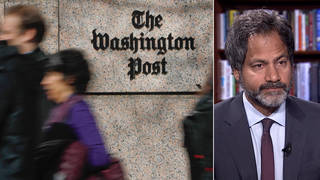
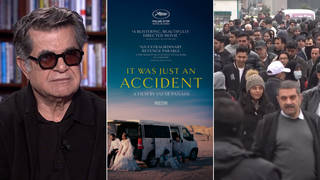
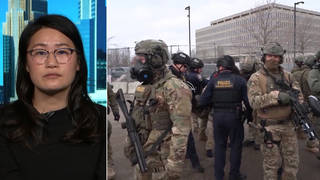
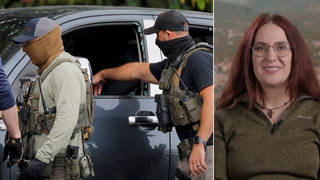

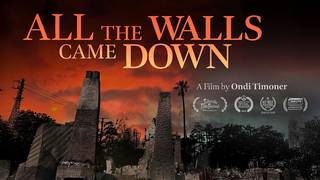
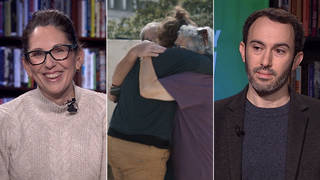
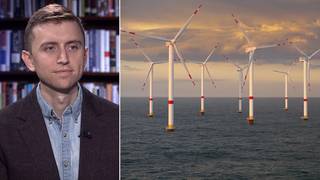

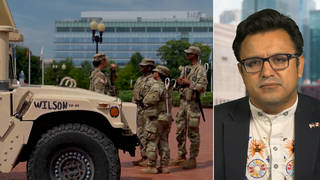

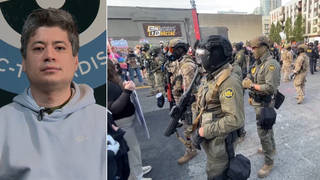
Media Options